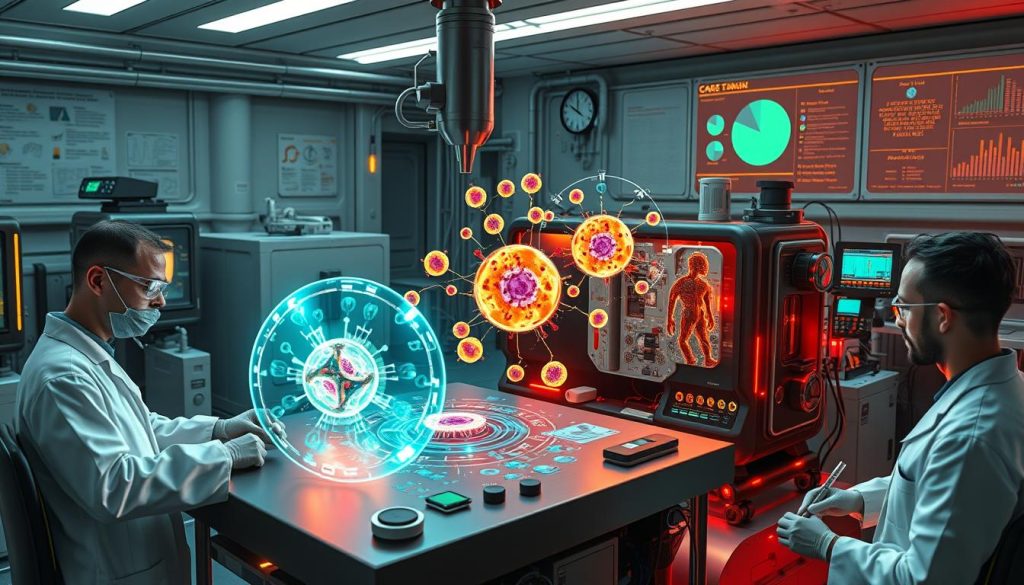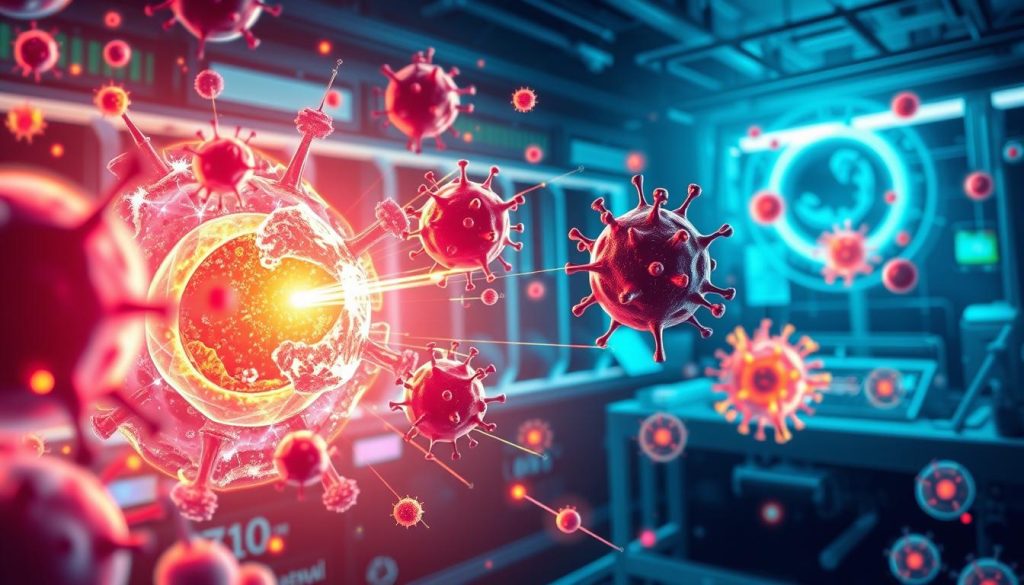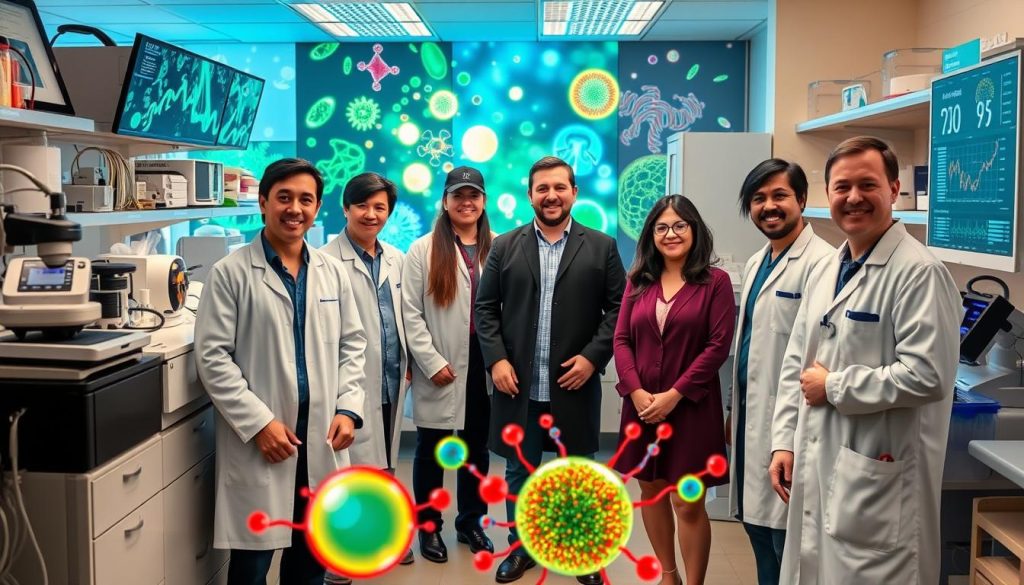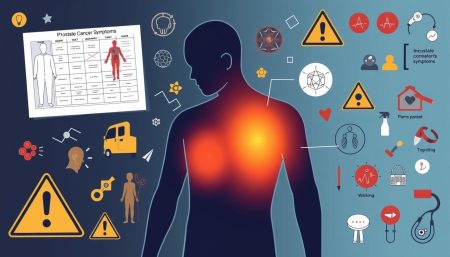Novartis is a global leader in cellular immunotherapy. They are pioneers in CAR T cell therapies. These therapies use the body’s immune system to fight cancer, giving hope to patients with blood cancers and other malignancies.
Novartis is leading the way in cancer care with CAR T cell therapy. They genetically modify T cells to target and destroy cancer cells. This approach is a major change in cancer treatment.
Novartis Oncology focuses on blood cancers like leukemia and lymphoma. They have developed CAR T cell therapies that work well in clinical trials. These therapies are personalized, tailored to each patient’s needs and immune system.
We will explore the science behind Novartis CAR T cell therapy. We will look at the therapies developed by Novartis and their impact on cancer patients and their families.
Understanding CAR T Cell Therapy
CAR T cell therapy is a new way to fight cancer. It uses the body’s immune system to attack cancer cells. This method has changed how we treat some blood cancers, giving hope to those who have tried everything else.
What is CAR T Cell Therapy?
CAR T cell therapy is a form of immunotherapy. It changes a patient’s T cells to find and kill cancer cells. The T cells get a special receptor called a chimeric antigen receptor (CAR). This receptor helps them find cancer cells.
To make CAR T cells, several steps are taken:
- Collecting a patient’s T cells through a process called leukapheresis
- Genetically engineering the T cells in a laboratory to express the CAR
- Multiplying the modified CAR T cells to create millions of cancer-fighting cells
- Infusing the CAR T cells back into the patient’s bloodstream
How Does CAR T Cell Therapy Work?
After the CAR T cells are given back to the patient, they start to grow. They look for cancer cells with the specific protein they were made to target. When they find these cells, they attach and kill them.
“CAR T cell therapy is like giving patients a ‘living drug’ – permanently altered cells that continue to multiply in their bodies, fighting the cancer.”
One special thing about CAR T cell therapy is it can protect against cancer coming back for a long time. The T cells can stay in the body for months or years. They keep looking for and killing any cancer cells left behind.
| Cancer Type | CAR T Cell Therapy | Target Antigen |
|---|---|---|
| Acute Lymphoblastic Leukemia (ALL) | Kymriah (tisagenlecleucel) | CD19 |
| Diffuse Large B-cell Lymphoma (DLBCL) | Kymriah (tisagenlecleucel) | CD19 |
| Multiple Myeloma | Carvykti (ciltacabtagene autoleucel) | BCMA |
Novartis is a leading company in CAR T cell therapy. They have developed Kymriah and Carvykti. These products have shown great success in treating certain blood cancers. They offer hope to patients who have tried many other treatments.
Novartis: A Pioneer in CAR T Cell Therapy
In the world of cellular immunotherapy, Novartis is leading the way. They’ve changed cancer treatment with their CAR T cell therapies. As a top name in oncology, Novartis keeps pushing medical science forward and helping patients.

Novartis is all about new ideas, spending a lot on research and development. They’ve got a team of top scientists and partners working hard. They aim to understand the immune system better and use it to fight cancer. Thanks to their work, CAR T cell therapy has made big steps forward.
“Our mission is to reimagine medicine and transform cancer care. With CAR T cell therapy, we have the chance to give patients a game-changing treatment.” – Dr. Susanne Schaffert, President of Novartis Oncology
Novartis has made some big discoveries, like:
- Kymriah (tisagenlecleucel), the first FDA-approved CAR T cell therapy for certain types of leukemia and lymphoma
- Carvykti (ciltacabtagene autoleucel), a CAR T cell therapy for multiple myeloma patients who have tried other treatments
| Novartis CAR T Cell Therapy | Approved Indication | Year of FDA Approval |
|---|---|---|
| Kymriah | Acute Lymphoblastic Leukemia (ALL), Diffuse Large B-cell Lymphoma (DLBCL) | 2017, 2018 |
| Carvykti | Multiple Myeloma | 2022 |
Novartis keeps pushing the limits of CAR T cell therapy. They’re at the forefront of fighting cancer. With a strong pipeline and ongoing trials, Novartis is ready to keep changing the future of cellular immunotherapy. They’re giving hope to patients all over the world.
Kymriah: Novartis’ Groundbreaking CAR T Cell Therapy
Novartis Oncology has changed cancer treatment with Kymriah, the first FDA-approved CAR T cell therapy. It uses a patient’s immune system to fight cancer. This gives hope to those with certain leukemia and lymphoma types.
Kymriah for Acute Lymphoblastic Leukemia (ALL)
Kymriah, also known as tisagenlecleucel, has shown great success in treating ALL in kids and young adults. In trials, 83% of patients got complete remission within three months. This makes Kymriah a lifesaving treatment for many.
Kymriah for Diffuse Large B-cell Lymphoma (DLBCL)
Kymriah also works well for DLBCL in adults. In a key trial, 52% of patients got complete or partial remission. This gives a new hope for those who’ve tried other treatments.
“Kymriah has given me a second chance at life. I am grateful for this groundbreaking treatment and the dedicated team at Novartis Oncology.”
— Sarah, Kymriah recipient
Kymriah’s Efficacy and Safety Profile
Kymriah’s success and safety have been shown in many trials. Side effects like cytokine release syndrome (CRS) and neurological events can happen. But, they are usually manageable with good care.
Novartis is always working to make Kymriah better. They aim for the best results for patients. With ongoing research, Kymriah’s promise grows, giving hope to those fighting leukemia and lymphoma.
Carvykti: Novartis’ Latest CAR T Cell Therapy Innovation
Novartis is a global leader in CAR T cell therapy. They have introduced Carvykti, a new treatment for multiple myeloma. This therapy uses a patient’s immune system to fight cancer, giving hope to those with this disease.

Carvykti is a personalized treatment. It reprograms a patient’s T cells to target and kill cancer cells. These cells express the B-cell maturation antigen (BCMA). This approach has shown great results in clinical trials.
Carvykti for Multiple Myeloma Treatment
Multiple myeloma is a cancer of plasma cells in the bone marrow. It’s hard to treat. But Carvykti offers a new hope for those who have tried other treatments. In trials, Carvykti has shown impressive results.
| Response Category | Percentage of Patients |
|---|---|
| Overall Response Rate | 97.9% |
| Complete Response or Better | 78.4% |
| Very Good Partial Response or Better | 91.8% |
These results show Carvykti’s great promise for treating multiple myeloma. As Novartis Oncology keeps improving CAR T cell therapy, Carvykti marks a big step forward in cancer care.
The Science Behind Novartis’ CAR T Cell Therapies
Novartis leads in creating new treatments for cancer using chimeric antigen receptor t cell immunotherapy. Their work is based on solid science and the latest technologies.
At the heart of Novartis’ work is the chimeric antigen receptor (CAR) technology. This method changes a patient’s T cells to find and kill cancer cells. It uses the immune system to fight cancer.
Chimeric Antigen Receptor (CAR) Technology
The CAR has three parts:
- An outside part that finds and sticks to cancer cell markers
- A middle part that keeps the receptor in the T cell
- An inside part that starts the T cell’s attack on cancer cells
Choosing the right antigen is key for CAR T cell therapy. Novartis targets CD19, found on B cells in blood cancers.
Tisagenlecleucel: The Backbone of Kymriah
Tisagenlecleucel is the core of Novartis’ Kymriah. It’s made by taking a patient’s T cells, changing them to find CD19, and putting them back in the patient.
Studies have shown tisagenlecleucel works well for acute lymphoblastic leukemia (ALL) and diffuse large B-cell lymphoma (DLBCL). It’s approved worldwide.
| Indication | Response Rate | Median Duration of Response |
|---|---|---|
| Pediatric and Young Adult ALL | 82.5% | Not reached |
| Adult DLBCL | 52% | 9.2 months |
“The development of tisagenlecleucel represents a significant milestone in the field of cancer immunotherapy. It showcases the potential of CAR T cell therapy to provide a valuable treatment option for patients with limited alternatives.” – Dr. Carl June, University of Pennsylvania
Novartis keeps working to improve CAR T cell therapy. They aim to help more patients with this life-changing treatment.
Novartis’ Commitment to Advancing Cellular Immunotherapy
Novartis is a global leader in cellular immunotherapy. It is dedicated to making this field of cancer treatment better. With big investments in research, Novartis Oncology is always looking to improve CAR T cell therapy.
The company is all about innovation. It has many clinical trials to see how cellular immunotherapy works on different cancers. Novartis works with top research places around the world to make new CAR T cell therapies better.

Novartis does more than just research. It wants to make sure patients get these treatments. By working with doctors and insurance companies, Novartis helps patients get CAR T cell therapy, no matter where they are or how much money they have.
“Our mission is to reimagine medicine and transform the lives of patients through innovative cellular therapies like CAR T. We won’t rest until every patient who can benefit from these treatments has access to them.” – Susanne Schaffert, President of Novartis Oncology
Novartis’ work in cellular immunotherapy is already showing great results. Its CAR T cell therapies, Kymriah and Carvykti, are helping many patients. The company is also working on new treatments for:
- Acute lymphoblastic leukemia (ALL)
- Diffuse large B-cell lymphoma (DLBCL)
- Multiple myeloma
- Chronic lymphocytic leukemia (CLL)
- Follicular lymphoma
| Novartis CAR T Cell Therapy | Indication | Approval Status |
|---|---|---|
| Kymriah | Pediatric and young adult ALL, DLBCL | FDA approved |
| Carvykti | Multiple myeloma | FDA approved |
| CTL119 | CLL | In clinical trials |
As Novartis Oncology keeps working on cellular immunotherapy, the future looks bright for cancer patients. Novartis is committed to making CAR T cell therapy better. This could change cancer treatment and bring hope to many people.
Patient Stories: Lives Transformed by Novartis CAR T Cell Therapy
Novartis’ CAR T cell therapies have changed lives. These stories show the power of car t cell therapy novartis. They bring hope to those fighting cancer.
Sarah, a young woman, was diagnosed with acute lymphoblastic leukemia (ALL). She tried many treatments but needed Kymriah, Novartis’ CAR T cell therapy. After a few weeks, Sarah’s cancer was gone, and she could live again.
“Kymriah gave me a second chance at life,” Sarah shared. “I’m forever grateful to the researchers and doctors at Novartis who made this incredible therapy possible.”
John, with diffuse large B-cell lymphoma (DLBCL), also found hope in Kymriah. He had tried many treatments but Kymriah worked. Now, John is cancer-free and enjoying time with his family.
Maria, a mother of two, had multiple myeloma for years. Carvykti, Novartis’ latest therapy, gave her new hope. She’s seeing her cancer reduce, and she’s hopeful for the future.
These stories show how Novartis’ CAR T cell therapies can change lives. They offer hope to those facing tough cancers.
The Future of CAR T Cell Therapy at Novartis
Novartis is leading the way in cellular immunotherapy with CAR T cell therapy. They aim to make treatments better and reach more patients. This is shown through their ongoing trials and research into new uses for this therapy.

Ongoing Clinical Trials and Research
Novartis is working hard on many clinical trials. They want to make their CAR T cell therapies, Kymriah and Carvykti, even better. They’re looking to reduce side effects and improve how well the treatments work over time.
They’re also exploring new ways to fight cancer. This includes making CAR T cells that can target different parts of tumors.
Some of the ongoing clinical trials at Novartis include:
- ELARA trial: Investigating the use of Kymriah in relapsed or refractory follicular lymphoma
- BELINDA trial: Evaluating Kymriah as a second-line treatment for aggressive B-cell non-Hodgkin lymphoma
- CARTITUDE-2 trial: Assessing the efficacy of Carvykti in earlier lines of treatment for multiple myeloma
Potential Expansion to Other Cancer Types
Novartis Oncology is excited about the possibilities of CAR T cell therapy. They’re working on using it for more types of cancer. This includes solid tumors and other blood cancers.
The table below shows some cancers that could be treated with Novartis’ CAR T cell therapy in the future:
| Cancer Type | Target Antigen | Potential Benefit |
|---|---|---|
| Multiple Myeloma | BCMA | Improved outcomes for heavily pretreated patients |
| Chronic Lymphocytic Leukemia | CD19 | Durable remissions in relapsed or refractory cases |
| Acute Myeloid Leukemia | CD123 | New treatment option for a challenging disease |
| Solid Tumors (e.g., breast, lung) | Various (e.g., HER2, EGFR) | Potential to address advanced, treatment-resistant cases |
As Novartis keeps investing in research, the future of CAR T cell therapy looks bright. It could change the lives of many cancer patients around the world. Jay Bradner, President of the Novartis Institutes for BioMedical Research, says:
We are committed to advancing cell and gene therapies that have the power to change cancer treatment. Our goal is to make these innovative therapies available to as many patients as possible, as soon as possible.
Accessing Novartis CAR T Cell Therapies
Novartis is dedicated to making CAR T cell therapies like Kymriah and Carvykti available to those in need. If you or a loved one is thinking about CAR T cell therapy, knowing the eligibility and where to get it is key.
Eligibility Criteria for Treatment
To qualify for Kymriah or Carvykti, patients must meet certain criteria. This includes:
- Diagnosis of a qualifying condition (e.g., ALL, DLBCL, or multiple myeloma)
- Age requirements (varies by therapy and indication)
- Prior treatment history (e.g., relapsed or refractory to other therapies)
- Overall health status and ability to tolerate the treatment process
Your healthcare provider will assess if Novartis CAR T cell therapy is right for you based on your situation.
Treatment Centers and Availability
Kymriah and Carvykti are offered at select certified treatment centers in the U.S. These centers are trained and ready to administer CAR T cell therapies. Novartis is adding more centers to make these treatments more accessible.
| Therapy | Number of Certified Centers |
|---|---|
| Kymriah | Over 100 |
| Carvykti | Over 50 |
To locate a certified treatment center near you, talk to your healthcare provider or visit the Kymriah and Carvykti websites for details.
“Our goal is to ensure that every patient who may benefit from our CAR T cell therapies has access to them.” – Novartis spokesperson
Novartis’ Partnerships in CAR T Cell Therapy Development
In the world of car t cell therapy, Novartis has teamed up with top universities and companies. This move has sped up the growth and reach of these new treatments. It has also brought hope to those fighting cancer.

Novartis and the University of Pennsylvania have made a big impact. Their work led to Kymriah, the first CAR T cell therapy approved by the FDA. This therapy helps with certain types of leukemia and lymphoma. Their partnership shows how research and drug development can change cancer care.
Novartis has also teamed up with places like Dana-Farber Cancer Institute and Texas Children’s Hospital. These partnerships aim to find new uses for CAR T cell therapy. They work on making the therapy safer and more effective for different cancers.
“Our partnerships are essential to our mission of reimagining medicine and delivering transformative therapies to patients in need. By working together, we can accelerate innovation and bring the promise of cellular immunotherapy to more people around the world.” – Dr. Carl June, University of Pennsylvania
Novartis has also partnered with biotech companies focused on cell therapy. These alliances help solve problems in making and delivering CAR T cell therapies. By sharing their knowledge and resources, Novartis and its partners aim to make these treatments available to more patients globally.
Overcoming Challenges in CAR T Cell Therapy
CAR T cell therapy has made great strides in treating blood cancers. Yet, there are challenges to make it more available. Novartis, a leader in gene-modified cell therapy, is tackling these issues.
Creating personalized CAR T cell therapies is complex. It involves taking a patient’s T cells, modifying them to fight cancer, and then giving them back. Novartis is improving its facilities and methods to make this process faster and more efficient.
Manufacturing and Logistics
Novartis has set up a global network for making and delivering CAR T cell therapies. The company uses advanced technology and automation to make production better and more consistent.
| Manufacturing Site | Location | Capacity |
|---|---|---|
| Morris Plains | New Jersey, USA | High |
| Stein | Switzerland | Medium |
| Les Ulis | France | Medium |
Cost and Reimbursement
High costs are a big challenge for CAR T cell therapies. Novartis wants to make these treatments more affordable. The company is working with payers, healthcare providers, and governments to find better pricing and reimbursement options.
“We are committed to working with all stakeholders to ensure that patients who can benefit from our CAR T cell therapies have access to them.”
– Susanne Schaffert, President of Novartis Oncology
Novartis is looking into ways to make CAR T cell therapy more cost-effective. They aim to identify the right patients and improve manufacturing processes. By tackling these challenges, Novartis hopes to make its CAR T cell therapies available to more patients.
Novartis CAR T Cell Therapy: Revolutionizing Cancer Treatment Landscape
Novartis is a global leader in novartis oncology. It has changed the cancer treatment world with its chimeric antigen receptor t cell immunotherapy. With Kymriah and Carvykti, Novartis shows its strong commitment to cellular immunotherapy and better patient results. These car t cell therapy novartis treatments use a patient’s immune system to fight cancer. They offer hope to those with aggressive blood cancers like ALL, DLBCL, and multiple myeloma.
The success of Novartis’ gene-modified cell therapy comes from years of research and teamwork with top experts. Novartis uses advanced technologies like CAR and tisagenlecleucel. These therapies target and kill cancer cells while protecting healthy tissue. The lives changed by these treatments show the amazing power of CAR T cell therapy.
Novartis keeps exploring new ways in cellular immunotherapy. Ongoing trials and research could make car t cell therapy novartis work for more cancers. Novartis works on making treatments more accessible and affordable. With its innovative spirit and focus on patient care, Novartis is set to keep changing cancer treatment with chimeric antigen receptor t cell immunotherapy.
FAQ
Q: What is CAR T cell therapy?
A: CAR T cell therapy is a new way to fight cancer. It uses the body’s immune system. T cells are changed to find and kill cancer cells better.
Q: How does Novartis’ CAR T cell therapy work?
A: Novartis’ therapy starts by taking T cells from a patient. These cells are then changed to find cancer. After, they are put back into the patient to fight cancer.
Q: What types of cancer can be treated with Novartis’ CAR T cell therapies?
A: Novartis’ therapies are for some cancers like leukemia and lymphoma. Kymriah treats acute lymphoblastic leukemia and diffuse large B-cell lymphoma. Carvykti is for multiple myeloma.
Q: What sets Novartis apart as a leader in CAR T cell therapy?
A: Novartis leads in CAR T cell therapy. They focus on improving this treatment. They’ve brought two therapies to market, Kymriah and Carvykti.
Q: How effective are Novartis’ CAR T cell therapies?
A: Novartis’ therapies have shown great results in clinical trials. Many patients who tried other treatments saw improvement or remission with Kymriah or Carvykti.
Q: Are there any side effects associated with CAR T cell therapy?
A: Yes, CAR T cell therapy can have side effects. These include cytokine release syndrome, neurological issues, and B-cell aplasia. Novartis has ways to manage these and keep patients safe.
Q: How can patients access Novartis’ CAR T cell therapies?
A: Patients should talk to their doctor to see if they can get these therapies. If they can, they’ll go to a treatment center. There, a team will help them through the process.
Q: What is the future of CAR T cell therapy at Novartis?
A: Novartis is working hard to make CAR T cell therapy better. They want to treat more cancers. They’re doing research to make these treatments safer and more effective for everyone.


















